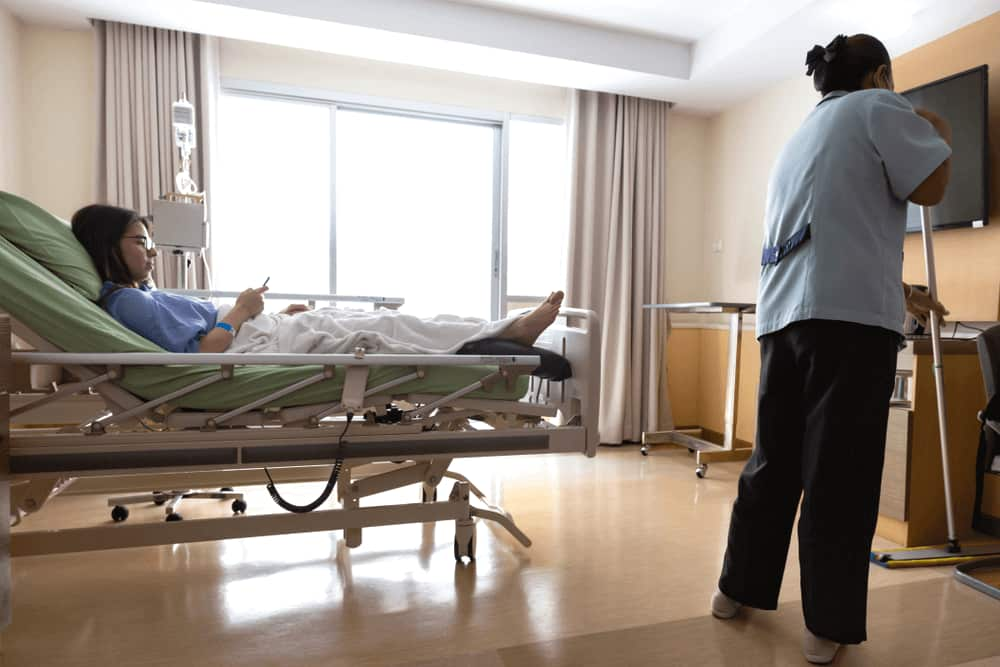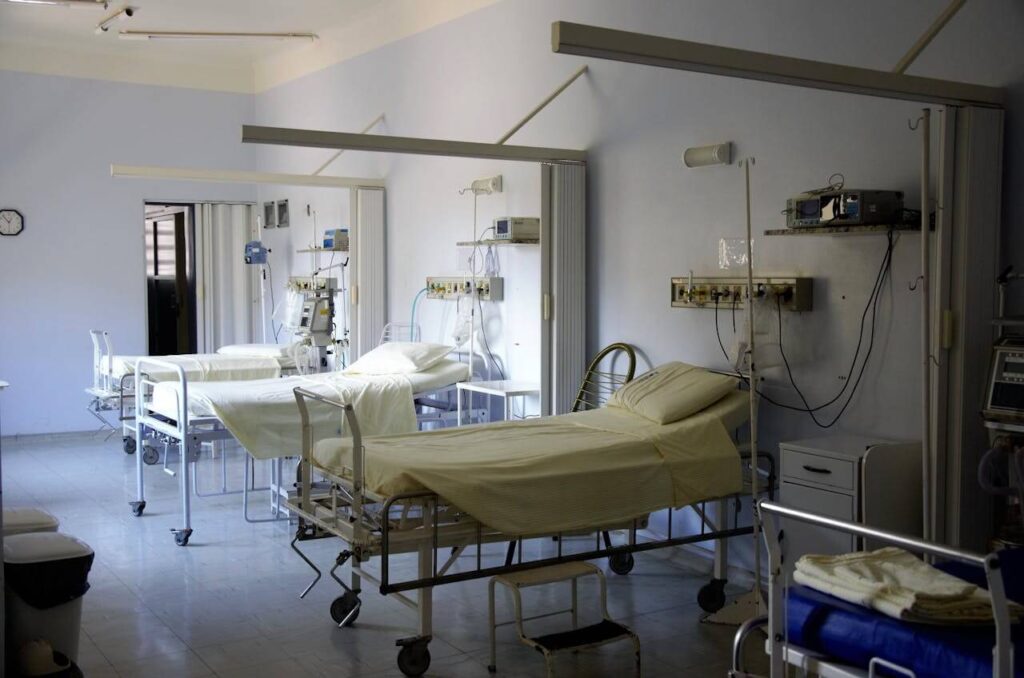When it comes to commercial cleaning, many businesses may view it as simply a matter of aesthetics. However, cleaning in commercial spaces, particularly in sensitive environments like medical facilities, is governed by strict health and safety regulations.
These regulations exist for a reason: to ensure the well-being of employees, customers, and anyone who enters the building. Compliance with these regulations is not just a legal obligation but also a critical aspect of creating a safe and healthy environment.
In this article, we’ll explore the importance of complying with health and safety regulations in cleaning, focusing on regulatory standards, compliance in medical facilities, how professional cleaning services can help meet legal requirements, and the potential penalties for non-compliance.
What Are Regulatory Standards for Commercial Cleaning?
1. Understanding Cleaning Regulations
Every industry has specific regulations to ensure that cleaning practices protect both the health of individuals and the environment.
These regulations are often established by governmental organizations such as the Occupational Safety and Health Administration (OSHA), the Centers for Disease Control and Prevention (CDC), and the Environmental Protection Agency (EPA).
- OSHA Guidelines: OSHA outlines specific cleaning and disinfection protocols to minimize occupational exposure to hazardous substances.
- CDC Recommendations: The CDC provides recommendations for infection control and sanitation, particularly relevant to healthcare settings.
- EPA Regulations: The EPA enforces regulations on the types of cleaning chemicals that can be used, ensuring that products meet standards for safety and environmental impact.
These regulatory bodies ensure that cleaning services maintain high standards of hygiene while using chemicals and processes that don’t pose a threat to health or the environment.
2. Legal Compliance and Risk Management
For businesses, complying with these regulations is essential to avoid legal issues, ensure the safety of their premises, and protect their reputation. Non-compliance can lead to penalties, financial loss, and damage to customer trust.
Proper cleaning protocols minimize health risks and create a safer work environment, which is critical for employee well-being and customer satisfaction.
The Importance of Compliance in Medical Facilities

1. Why Cleanliness Is Crucial in Healthcare Settings
In medical facilities, the stakes are even higher. Hospitals, clinics, and other healthcare environments are held to the strictest cleaning standards due to the potential for infection transmission.
Patients in these settings are often immunocompromised, and improper cleaning can lead to dangerous health outcomes, including hospital-acquired infections (HAIs).
- Preventing Infection: Cleaning protocols in medical facilities must prioritize the prevention of infection through the proper use of disinfectants, thorough cleaning of high-touch surfaces, and specialized cleaning in sensitive areas like operating rooms.
- Reducing Cross-Contamination: Healthcare workers, patients, and visitors all contribute to the risk of cross-contamination, making regular and compliant cleaning essential.
2. Meeting Industry-Specific Cleaning Requirements
Healthcare cleaning is governed by specific regulations such as the Health Insurance Portability and Accountability Act (HIPAA) and the CDC’s Healthcare Infection Control Practices Advisory Committee (HICPAC).
These standards dictate how cleaning should be performed to minimize health risks. Professional cleaning companies that work in healthcare environments must be thoroughly familiar with these requirements and trained to adhere to them meticulously.
How Professional Cleaning Helps Businesses Meet Legal Requirements
1. Expertise in Health and Safety Standards
Professional cleaning companies are well-versed in the latest health and safety regulations, which means they are equipped to ensure compliance in any environment.
Whether it’s understanding which disinfectants are EPA-approved or knowing the correct cleaning procedures for high-risk areas, professional cleaners have the expertise needed to keep your business aligned with legal standards.
- Tailored Cleaning Plans: Professional cleaners assess your business and create a tailored cleaning plan that meets regulatory requirements for your specific industry.
- Trained Staff: These companies employ staff who are trained in the proper use of cleaning chemicals, the correct handling of hazardous waste, and the right procedures for cleaning and disinfecting surfaces to meet health codes.
2. Using Compliant Cleaning Products
One of the key components of regulatory compliance is using the correct cleaning products. Not all cleaning agents are created equal, and many common products can fail to meet the safety and environmental standards set by organizations like the EPA.
Professional cleaning services ensure that they use eco-friendly, non-toxic cleaning solutions that comply with safety standards while still effectively cleaning and disinfecting the space.
- Chemical Management: Professionals manage chemicals correctly, ensuring that they are stored, handled, and disposed of according to OSHA and EPA regulations.
- Safe Disinfectants: In settings like hospitals and schools, only EPA-approved disinfectants that kill harmful bacteria and viruses without endangering humans or the environment are used.
Penalties for Non-Compliance
1. Financial Fines and Penalties
One of the most immediate consequences of non-compliance with cleaning regulations is the potential for fines. Regulatory bodies like OSHA have the authority to levy significant financial penalties against businesses that fail to adhere to health and safety standards.
These fines can range from a few hundred to thousands of dollars depending on the severity of the violation.
- OSHA Penalties: OSHA fines can be particularly high for serious violations, such as failing to provide a clean and safe work environment.
- EPA Fines: Using or disposing of non-compliant cleaning products can result in heavy fines from the EPA, particularly if the products are deemed harmful to the environment.
2. Legal Repercussions
Beyond financial penalties, businesses can also face lawsuits if their non-compliance leads to harm. For example, if an employee or customer gets sick due to poor cleaning practices, the business could be held liable.
In healthcare settings, this risk is even higher, as improper cleaning can lead to life-threatening infections that may result in malpractice claims.
- Liability Risks: Non-compliance increases the risk of legal claims related to employee or customer harm, particularly in high-risk environments like hospitals and care homes.
3. Damage to Reputation
In addition to the legal and financial repercussions, non-compliance can severely damage a business’s reputation. Customers and clients expect clean, safe environments, and if your business is found to be negligent in this area, it can erode trust and drive people away.
- Loss of Customer Trust: Word spreads quickly in the digital age, and customers are unlikely to return to a business that has been penalized for unsafe cleaning practices.
- Impact on Employee Morale: Employees also value a clean and safe workspace. If a company is found to be cutting corners when it comes to cleaning, it can negatively affect employee morale and retention.
Ensuring Long-Term Compliance with Professional Cleaning Services
1. Routine Inspections and Audits
One of the best ways to ensure long-term compliance with health and safety regulations is through regular inspections and audits.
Professional cleaning companies often perform routine checks to ensure that all cleaning protocols are being followed correctly and that no areas of concern are overlooked.
- Spot-Checking: Professional cleaners will spot-check high-risk areas like bathrooms and kitchens to ensure that cleaning and disinfecting standards are maintained.
- Documentation: In many industries, documenting cleaning practices is part of regulatory compliance. Professional services often keep detailed records of the products used, procedures followed, and schedules maintained.
2. Training and Certification
Professional cleaning services invest in ongoing training and certification for their staff. This ensures that they stay up-to-date on the latest regulations and best practices.
Whether it’s learning about new EPA-approved cleaning products or updated OSHA regulations, professional cleaners are equipped to ensure that your business remains compliant at all times.
- Employee Training: Professional companies regularly train employees in health and safety standards, chemical handling, and proper sanitation techniques.
- Certifications: Many companies offer certifications in compliance with OSHA, EPA, and CDC standards, giving businesses peace of mind that they are following best practices.
3. Adapting to Regulatory Changes
Health and safety regulations are always evolving. New research into infection control or environmental sustainability can lead to updated guidelines, and businesses must adapt quickly to remain compliant.
Professional cleaning companies make it their business to stay informed of regulatory changes and update their practices accordingly.
- Up-to-Date Practices: Because professional cleaning companies specialize in this field, they are quick to adapt to new regulations, ensuring that your business always meets current standards.
- Proactive Approach: These companies take a proactive approach to compliance, often recommending updates or improvements to cleaning protocols based on regulatory changes or emerging best practices.
Conclusion
Compliance with health and safety regulations in commercial cleaning is not just a legal requirement but also a fundamental aspect of maintaining a safe and healthy environment.
Professional cleaning services are essential partners in ensuring that your business meets these regulations, using their expertise to develop tailored cleaning plans, employ compliant products, and stay current with evolving standards.
From healthcare settings to offices, compliance protects your employees, clients, and the overall reputation of your business.
By choosing professional cleaning services that prioritize compliance, you can mitigate risks, avoid costly penalties, and create a space that is safe, hygienic, and welcoming for everyone.
FAQs
-
What are the main regulatory bodies overseeing cleaning practices?
The main regulatory bodies include OSHA, CDC, and EPA. These organizations set guidelines for cleaning practices, chemical safety, and infection control.
-
Why is compliance important in healthcare cleaning?
In healthcare, improper cleaning can lead to infection spread and other health risks. Compliance ensures patient and staff safety by following stringent cleaning and disinfecting protocols.
-
Can non-compliance with cleaning regulations result in legal action?
Yes, businesses can face lawsuits if their non-compliance leads to harm, such as illness or injury due to poor cleaning practices.
-
How do professional cleaning services ensure regulatory compliance?
Professional cleaning services train their staff in the latest regulations, use compliant products, and perform regular audits to ensure all standards are met.
-
What are the consequences of non-compliance with cleaning regulations?
Penalties include financial fines, legal repercussions, damage to reputation, and potential health risks for employees and customers.

